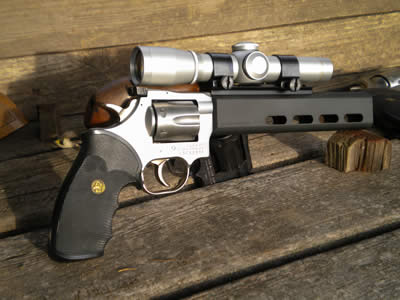Supporter

Moderators

Dans Club
February 22, 2009
 Offline
OfflineAs taken from Grant Cunningham's blog. My father works in state government and tells me virtually the same thing when writing your Governor:
- The first and most important thing you need to understand is that unless he/she knows you personally, your Senator or Representative will likely never see your letter. His/her office has aides or corespondents whose job it is to read the mail, categorize each response as for or against, and file it in the appropriate place. The Congressperson checks in with the aides (who are assigned to specific issues, like gun control) on a regular basis, asking how many times they've heard from constituents on the specific issue at hand. They'll be told how many letters they've received and what the for/against percentages are, but are unlikely to get anything more specific unless they ask. If the majority of the letters are on one side, that's what they'll be told.
- Remember that aides are usually fresh out of college, idealistic, and not very well paid. Don't be rude and never insult them or their boss or your letter will go missing - from what I've been told it's a sure bet. Don't say anything about your Congressperson being a scum-sucking gun grabber even if it is true; be polite, even if it kills you.
- Don't use paper. As a security precaution all snailmail goes to a central location where it's irradiated, examined, opened, scanned (probably with OCR) into an electronic file, and then that file is delivered to your Congressperson's office. They never see the paper unless they request it specifically. This process is said to take a week at best, and if there is a huge influx of correspondence it might take two or three or more. If there is a time-sensitive issue, as this is, a paper letter will almost certainly be too late. An email gets there faster and ends up in the same place anyhow, so there is no longer a reason to put pen to paper when writing Congress. Send an email.
- Don't write a book. The aides have a ton of letters to go through, don't have a lot of time, and are easily bored. Your letter should consist of a paragraph or two at the very most: tell them what you're writing about, how you want them to vote, and why it's important to you. That's it; resist the urge to write more. Ideally you should get that done in three well-crafted sentences, and as the volume of mail goes up the greater the importance of making your letter concise.
- If you're not a constituent - yes, they check - your letter will generally be ignored. In other words, unless you're actually in Feinstein's district don't waste your time writing her office; it won't do any of us any good even if you are polite.
- How do you make sure they know you’re a constituent? Put your name and address in the letter. I get emails constantly where the only identifier of the sender is "toughguy37@aol.com". To me it's just annoying, but it causes Congressional aides to conclude one of two things: you're either out of district or sending robomails, either of which will cause your email to go right into the electronic trashcan. If you don't want that to happen put your FULL NAME and address in the body.
- Make sure your email has a subject; those without subjects might be filtered out by their office email system. I’m told the best thing to do is to put the title/number of the actual bill in the subject line so that the reason for your letter can be quickly determined.
- The NRA will probably send you an email with links to form letters that you can send to your Congressperson. DON'T DO IT. Form letters are nearly useless; when the aides are queried, one of the questions they're asked is what percentage of letters are of the form variety and which were actually written. The form letters have FAR less impact than those you send from your own keyboard (some say they are simply ignored. After all, if it was really important to you, you'd have written your own damn letter.) Again: DON'T USE FORM LETTERS. If you feel you can't make a good impression on the aides then have someone draft it for you, but don't use the prewritten missives from any group.
- If you even get a response it will almost certainly be a form letter. Deal with it. Go back to the first item: your Congressperson is NOT going to read your letter, and therefore is very unlikely to draft a personal response to you. Expect a form letter and don't go bitching on Facebook if you get one; it's just how the system works.
Now go use what you've learned, and let's see if we can head Feinstein's bill off at the pass!
Technically, the glass is always full; half liquid, half air....
Range Officer

Range Officers

Dans Club
March 27, 2009
 Offline
Offline
Dans Club
March 2, 2008
 Offline
OfflineI have also seen some discussion that actually sending a letter can be effective as well, it is a document that must be handled, read, and classified in some way. The fact that this takes more effort than sitting in my chair and punching out an email seems to resonate on some level.
I'm suggesting that we not resort to any ONE method.
Letter
Telephone call
Join groups that will unify on a message
Visit your local legislator's office
Testify or rally when legislation is pending
Instead of "AN" email or "A" letter, multiply the effect of your message by delivering the same message in several different ways.
If I told you that you could have the 732/CBOB/AGS, etc of your dreams for less than $100 and the commitment of several hours of your time, you would jump at that deal.
For less than $100 you can join the NRA and a local organization, with money left over for postage and gas money to visit your representatives office or State Capitol. You can write several letters and send lot's of email for the expenditure of less than an hour.
These activities WILL NOT get you the gun of your dreams, they might help you keep the guns you have.
Please do not make the mistake of thinking it can never happen in your state. Once an infection takes hold, it spreads. Even if Federal Gun Control fails, if enough states pass restrictive new laws, it makes future Federal legislation more likely the next time around, and there will always be a next time around.
I went to a bookstore and asked the saleswoman "Were is the Self Help Section?" She said if she told me, it would defeat the purpose.
George Carlin
1 Guest(s)

 Register
Register Log In
Log In Home
Home








